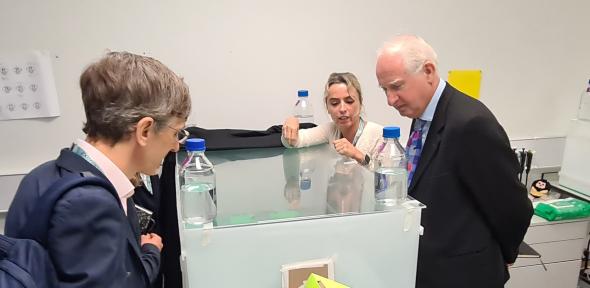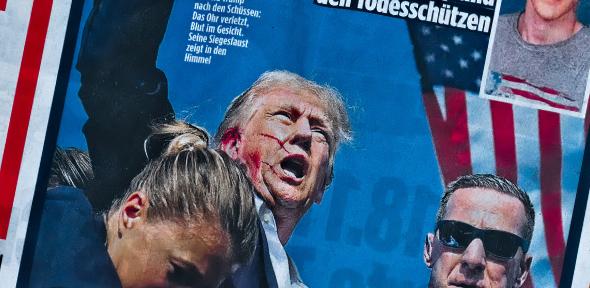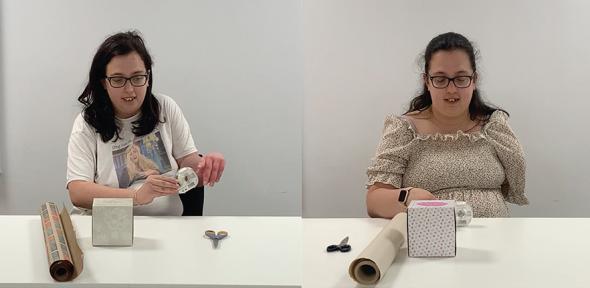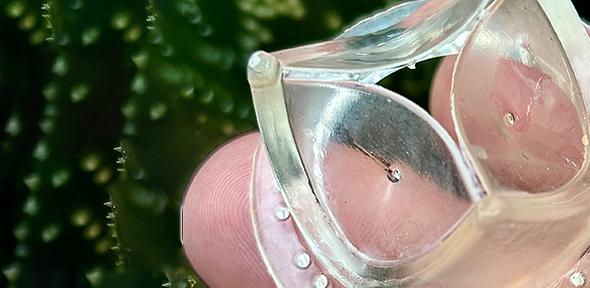
At a reception at the Vice-Chancellor’s Lodge this week, which celebrated his service to the University, Lord Sainsbury talked fondly about his own time as a student at Cambridge, and said: “It has been a great honour and pleasure to be Chancellor of the University of Cambridge, one of the world’s greatest universities.
“Over the years, I have watched with awe how the University has produced an endless stream of brilliant research and an enlightened education for its undergraduates and postgraduates, and I hope that by being Chancellor, and in a number of other ways, I have to some extent repaid my debt to the University. I will always look back at my time as Chancellor with the greatest pleasure.”
The Vice-Chancellor, Professor Deborah Prentice, paid a warm tribute to the Chancellor and thanked him for his service and contribution to the life of the University, and his support for her.
In a recent edition of CAM – the University’s alumni magazine – other friends and former colleagues recounted the unique qualities Lord Sainsbury has brought to the post during almost a decade and a half of unwavering commitment.
With high-level experience in government and industry alike, Lord Sainsbury has been a highly effective advocate for the best interests of the University on both the national and global stage. “He’s a man of great ability and thoughtfulness,” says Professor Mike Proctor, 2013-2023 Provost of King’s College, Lord Sainsbury’s alma mater. “He’s very well connected in both the public and private sectors. And that’s been very helpful to the University at large.”
Professor Stephen Toope, the 346th Vice-Chancellor, says that although the role is technically ceremonial, Lord Sainsbury was always willing to go above and beyond. “If I asked him to do something for the University – connect me with the right person, give me a piece of advice – he always did it. He was very generous in making introductions, and saw his role as trying to strengthen the University where he could. And that was largely by supporting the people who’d been asked to do the big jobs – on the Council and in the leadership of Cambridge.”
As a former Minister of Science and Innovation, Lord Sainsbury has brought a wealth of experience to the University. But he has also brought his own love of research and innovation to bear, as Rebecca Simmons, the VC’s former Chief of Staff and now COO of quantum computing company Riverlane, saw first-hand. “He liked to get into the detail beforehand, so he could make good connections with people,” she remembers. “And sometimes, he would come back to see the same people over several years. For example, he stayed in touch with the CEO of Endomag, a cancer diagnostics spinout, and made a point of going back to meet them at key moments. In fact, accompanying him on visits was one of the most fun parts of my job.”
Dr Regina Sachers, former Head of the Vice-Chancellor’s Office and now Director of Governance and Compliance, agrees. “He found it easy to connect with academics because he was genuinely interested in the work. He would always ask very informed questions, and would frequently offer his card and put people in touch with his own connections. It felt like a very genuine and low-key approach.”
The role of Vice-Chancellor can be lonely, says Sir Leszek Borysiewicz, Vice-Chancellor 2010-17: often, the only person you can talk to is the Chancellor. “And Lord Sainsbury always made himself available. He was a friend, a mentor, an adviser. We had differences of opinion, but we could always talk. Having that open debate meant you could road-test the strength of an argument – and, sometimes, backpedal, because he’d made some very valid points that were critical for the University. And I can attest that during my time as Vice-Chancellor, he was always there for the difficult issues. He was quiet and understated, but very thoughtful and very wise – and never interfered with the executive functions that the Vice-Chancellor has to exercise.”
“Lord Sainsbury does not have an agenda of his own: he seeks to do what the University needs, and always has its best interests at heart,” says current Vice-Chancellor Professor Deborah Prentice. “He approaches the job with selflessness and the mentality of a public servant. I like the fact that sometimes he just turns up to things; he’s such a curious and interested person. I think he very much embodies the values of the University.”
Professor Toope says that he has always been struck by Lord Sainsbury’s “complete lack of pomposity. Some people think they are the role. He always understood that the role is the role: he just happened to be occupying it for a period. And he brought a personal and political integrity to it.”
The election for Lord Sainsbury’s successor as Chancellor takes place next month.
After 14 years as Chancellor of the University, Lord Sainsbury of Turville has formally stood down from the role.

The text in this work is licensed under a Creative Commons Attribution-NonCommercial-ShareAlike 4.0 International License. Images, including our videos, are Copyright ©University of Cambridge and licensors/contributors as identified. All rights reserved. We make our image and video content available in a number of ways – on our main website under its Terms and conditions, and on a range of channels including social media that permit your use and sharing of our content under their respective Terms.



















